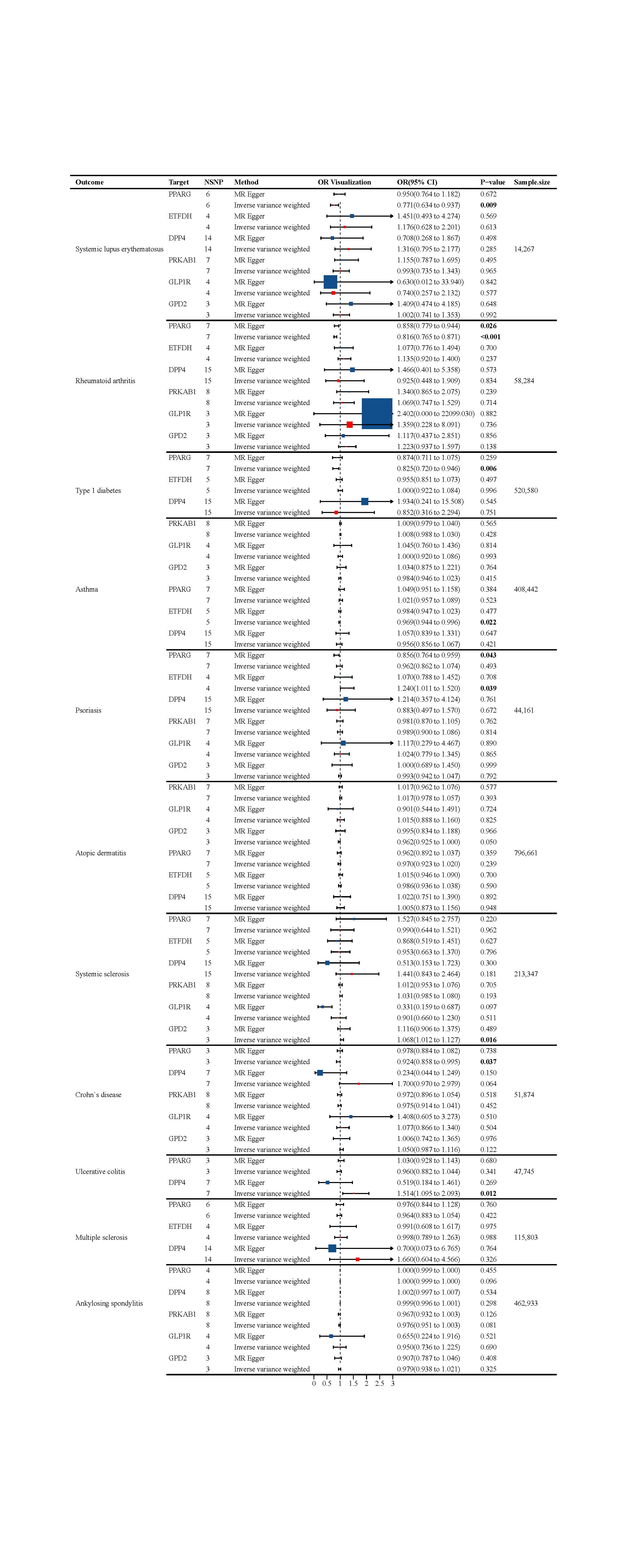Session Information
Session Type: Poster Session C
Session Time: 10:30AM-12:30PM
Background/Purpose: There are conflicting findings on the relationship between glucose-lowering drugs and risk of development of immune mediated inflammatory diseases (IMIDs). The study aimed to investigate whether genes encoding glucose-lowering drug targets are causally associated with the risk of IMIDs.
Methods: We developed genetic instruments for glucose-lowering drug targets (metformin [PRKAB1, ETFDH, GPD2], thiazolidinediones [PPARG], sulfonylureas [KCNJ11], glucagon-like peptide 1 analogues [GLP1R]; dipeptidyl peptidase 4 inhibitor [DPP4]) using summary genome-wide association data. Genetic instruments were constructed using cis-acting genome-wide significant (p< 5×10-5) single nucleotide polymorphisms (SNPs) permitted to be in linkage disequilibrium (r2< 0.001). Summary genetic association estimates for these SNPs were obtained from genome-wide association study (GWAS) consortia for the following IMIDs: systemic lupus erythematosus, rheumatoid arthritis, type 1 diabetes, asthma, psoriasis, atopic dermatitis, systemic sclerosis, inflammatory bowel disease, multiple sclerosis, ankylosing spondylitis. Inverse-variance weighted random-effects models adjusting for linkage disequilibrium were employed to estimate causal associations between genetically proxied drug target perturbation and risk of IMIDs. A colocalization posterior probability (PPH4) >80% was employed to indicate support for shared causal variants across drug targets and IMIDs.
Results: The GLP1R and KCNJ11 were not included in the MR analysis as the number of instrumental SNPs was less than three. In MR analysis, genetically proxied PPARG was associated with decreased risk of systemic lupus erythematosus (OR 0.77, 95% CI 0.63-0.94), rheumatoid arthritis (OR 0.82, 95% CI 0.76-0.87), type 1 diabetes (OR 0.83, 95% CI 0.72-0.95), Crohn’s disease (OR 0.92, 95% CI 0.86-1.00); ETFDH was associated with decreased risk of asthma (OR0.97, 95%CI 0.94-1.00); PRKAB1 was associated with decreased risk of psoriasis (OR 0.93, 95% CI 0.86-0.99). In contrast, genetically proxied DPP4 was associated with increased risk of ulcerative colitis (OR 1.51, 95% CI 1.10-2.09). A strong colocalizations association with PPARG were observed for rheumatoid arthritis and (rs1699346, PP.H4 = 0.99) and type 1 diabetes (rs1699362, PP.H4 = 0.82).
Conclusion: The drug target MR analyses identified several glucose-lowering drug targets associated with IMIDs. Future studies are warranted to clarify the underlying mechanistic pathways between thiazolidinediones, metformin, dipeptidyl peptidase 4 inhibitor and risk of IMIDs.
To cite this abstract in AMA style:
Wu D, jin Y. Genetically Proxied Glucose‑lowering Drug Target and Risk of Immune Mediated Inflammatory Disease: A Mendelian Randomization Study [abstract]. Arthritis Rheumatol. 2024; 76 (suppl 9). https://acrabstracts.org/abstract/genetically-proxied-glucose%e2%80%91lowering-drug-target-and-risk-of-immune-mediated-inflammatory-disease-a-mendelian-randomization-study/. Accessed .« Back to ACR Convergence 2024
ACR Meeting Abstracts - https://acrabstracts.org/abstract/genetically-proxied-glucose%e2%80%91lowering-drug-target-and-risk-of-immune-mediated-inflammatory-disease-a-mendelian-randomization-study/

